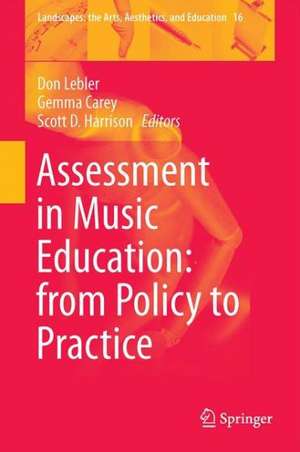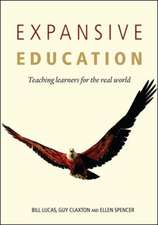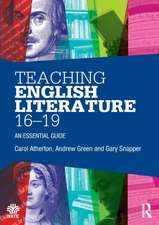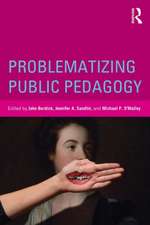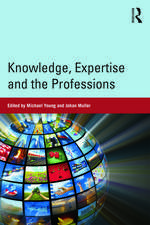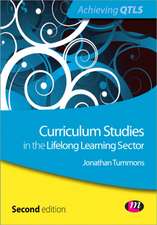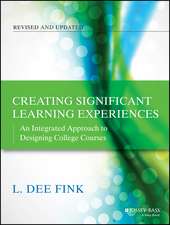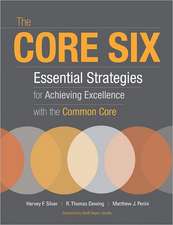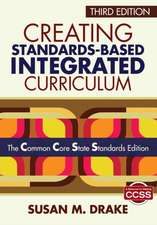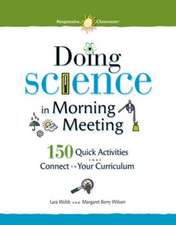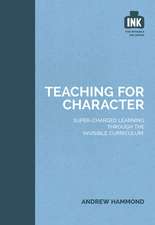Assessment in Music Education: from Policy to Practice: Landscapes: the Arts, Aesthetics, and Education, cartea 16
Editat de Don Lebler, Gemma Carey, Scott D. Harrisonen Limba Engleză Hardback – 14 noi 2014
An international group of leading researchers offers an exciting array of papers that focus on the practice of assessment in music, particularly in higher education settings. Contributions reflect on self-, peer- and alternative assessment practices in this environment. There is a particular emphasis on the alignment between assessment, curriculum structure and pedagogy.
| Toate formatele și edițiile | Preț | Express |
|---|---|---|
| Paperback (1) | 781.94 lei 6-8 săpt. | |
| Springer International Publishing – 10 sep 2016 | 781.94 lei 6-8 săpt. | |
| Hardback (1) | 788.09 lei 6-8 săpt. | |
| Springer International Publishing – 14 noi 2014 | 788.09 lei 6-8 săpt. |
Din seria Landscapes: the Arts, Aesthetics, and Education
- 20%
 Preț: 690.43 lei
Preț: 690.43 lei - 18%
 Preț: 888.31 lei
Preț: 888.31 lei - 18%
 Preț: 892.11 lei
Preț: 892.11 lei - 18%
 Preț: 728.60 lei
Preț: 728.60 lei - 23%
 Preț: 632.68 lei
Preț: 632.68 lei - 15%
 Preț: 639.73 lei
Preț: 639.73 lei - 18%
 Preț: 948.79 lei
Preț: 948.79 lei - 20%
 Preț: 565.08 lei
Preț: 565.08 lei - 15%
 Preț: 642.83 lei
Preț: 642.83 lei - 15%
 Preț: 644.95 lei
Preț: 644.95 lei - 24%
 Preț: 1158.48 lei
Preț: 1158.48 lei - 15%
 Preț: 645.28 lei
Preț: 645.28 lei - 15%
 Preț: 704.50 lei
Preț: 704.50 lei - 15%
 Preț: 646.30 lei
Preț: 646.30 lei - 15%
 Preț: 647.73 lei
Preț: 647.73 lei - 18%
 Preț: 998.66 lei
Preț: 998.66 lei - 18%
 Preț: 733.96 lei
Preț: 733.96 lei - 18%
 Preț: 784.92 lei
Preț: 784.92 lei - 18%
 Preț: 891.48 lei
Preț: 891.48 lei - 15%
 Preț: 701.40 lei
Preț: 701.40 lei - 18%
 Preț: 786.66 lei
Preț: 786.66 lei - 18%
 Preț: 885.49 lei
Preț: 885.49 lei -
 Preț: 424.99 lei
Preț: 424.99 lei - 18%
 Preț: 898.43 lei
Preț: 898.43 lei - 15%
 Preț: 641.71 lei
Preț: 641.71 lei -
 Preț: 350.89 lei
Preț: 350.89 lei - 18%
 Preț: 941.68 lei
Preț: 941.68 lei - 18%
 Preț: 779.39 lei
Preț: 779.39 lei - 18%
 Preț: 786.18 lei
Preț: 786.18 lei
Preț: 788.09 lei
Preț vechi: 961.09 lei
-18% Nou
Puncte Express: 1182
Preț estimativ în valută:
150.80€ • 157.14$ • 124.86£
150.80€ • 157.14$ • 124.86£
Carte tipărită la comandă
Livrare economică 03-17 aprilie
Preluare comenzi: 021 569.72.76
Specificații
ISBN-13: 9783319102733
ISBN-10: 3319102737
Pagini: 296
Ilustrații: XV, 296 p. 36 illus., 16 illus. in color.
Dimensiuni: 155 x 235 x 22 mm
Greutate: 0.62 kg
Ediția:2015
Editura: Springer International Publishing
Colecția Springer
Seria Landscapes: the Arts, Aesthetics, and Education
Locul publicării:Cham, Switzerland
ISBN-10: 3319102737
Pagini: 296
Ilustrații: XV, 296 p. 36 illus., 16 illus. in color.
Dimensiuni: 155 x 235 x 22 mm
Greutate: 0.62 kg
Ediția:2015
Editura: Springer International Publishing
Colecția Springer
Seria Landscapes: the Arts, Aesthetics, and Education
Locul publicării:Cham, Switzerland
Public țintă
ResearchCuprins
Glossary.- 1. Future Directions for Assessment in Music.- 2. Backwards Assessment Explanations: Implications for Teaching and Assessment Practice.- 3. Assessment in Music in the European Context: The Polifonia Project.- 4. Assessment in Music in the Australian Context: The AiM Project.- 5. Challenging Approaches to Assessment of Instrumental Learning.- 6. The Bachelor of Music: Purpose, Desires and Requirements.- 7. Participants’ Perceptions of the Role of Fair and Valid Assessment Tasks in Tertiary Music Education.- 8. Assessment and Critical Feedback in the Master-apprentice Relationship: Rethinking Approaches to the Learning of a Music Instrument.- 9. Assessing Music Performance Process and Outcome through a Rubric: Ways and Means.- 10. Embedding Creative and Critical Thinking in Performance Studies – the Challenge.- 11. A Search for Balance: The Development of a Performance Assessment form for Classical Instrumental Music in the Tertiary Context.- 12. Linking Assessment Practices, Unit-level Outcomes, and Discipline Specific Capabilities in Contemporary Music Studies.- 13. New Wine in Old Bottles: Aligning Curricula, Pedagogy and Assessment through Creative Practice in Classical and Contemporary Music.- 14. Assessments for Music Theory: Three Situations.- 15. The BoPMAT: Bachelor of Music Popular Music Program.- 16. The Amazing Marking Machine. A Process for Authentic, Efficient Assessment.- 17. Assessment and Feedback in Curricula Design for Contemporary Vocal Studies.- 18. Musical Theatre Assessment: Perspectives on the Efficacy of Continuous Assessment.- 19. Aligning Student Attitudes, Assessment, and Curriculum Design: A Case Study using “My Life as a Musician” Vocational Preparation Strand.- Concluding Thoughts: Assessment in Music for the 21st Century.
Textul de pe ultima copertă
The contributions to this volume aim to stimulate discussion about the role of assessment in the learning experiences of students in music and other creative and performing arts settings. The articles offer insights on how assessment can be employed in the learning setting to enhance outcomes for students both during their studies at higher education institutions and after graduation.
An international group of leading researchers offers an exciting array of papers that focus on the practice of assessment in music, particularly in higher education settings. Contributions reflect on self-, peer- and alternative assessment practices in this environment. There is a particular emphasis on the alignment between assessment, curriculum structure and pedagogy.
An international group of leading researchers offers an exciting array of papers that focus on the practice of assessment in music, particularly in higher education settings. Contributions reflect on self-, peer- and alternative assessment practices in this environment. There is a particular emphasis on the alignment between assessment, curriculum structure and pedagogy.
Caracteristici
Focuses on the alignment between assessment, curriculum structure and pedagogy in music education Draws together an international group of leading thinkers in assessment in music Provides alternative and innovative ways to conceptualize assessment activities in higher education Crosses genre boundaries in music education research Includes supplementary material: sn.pub/extras
